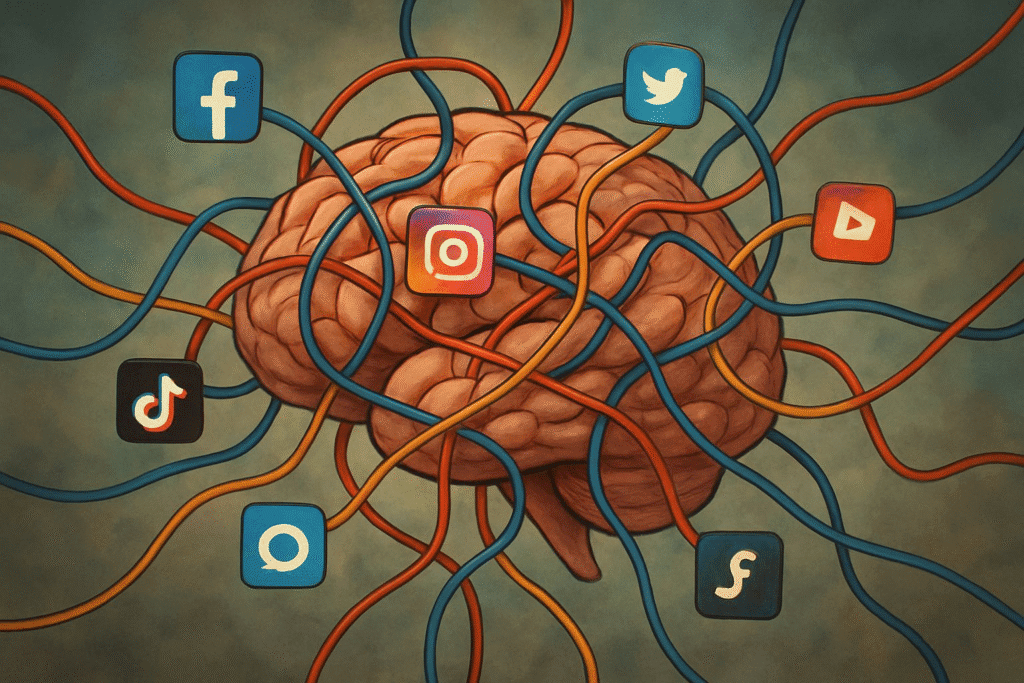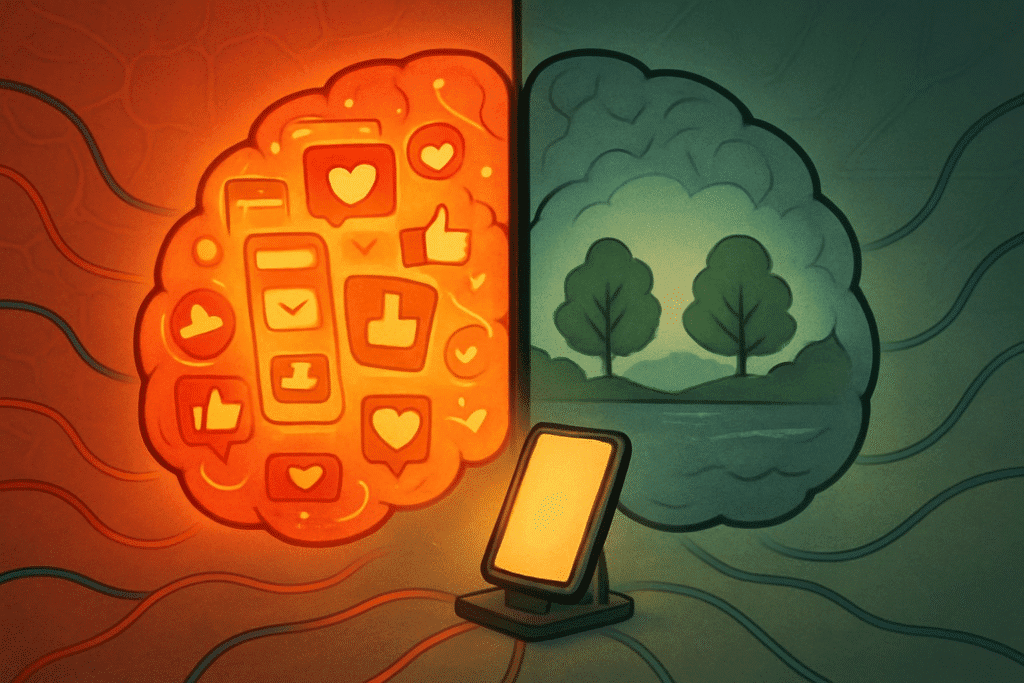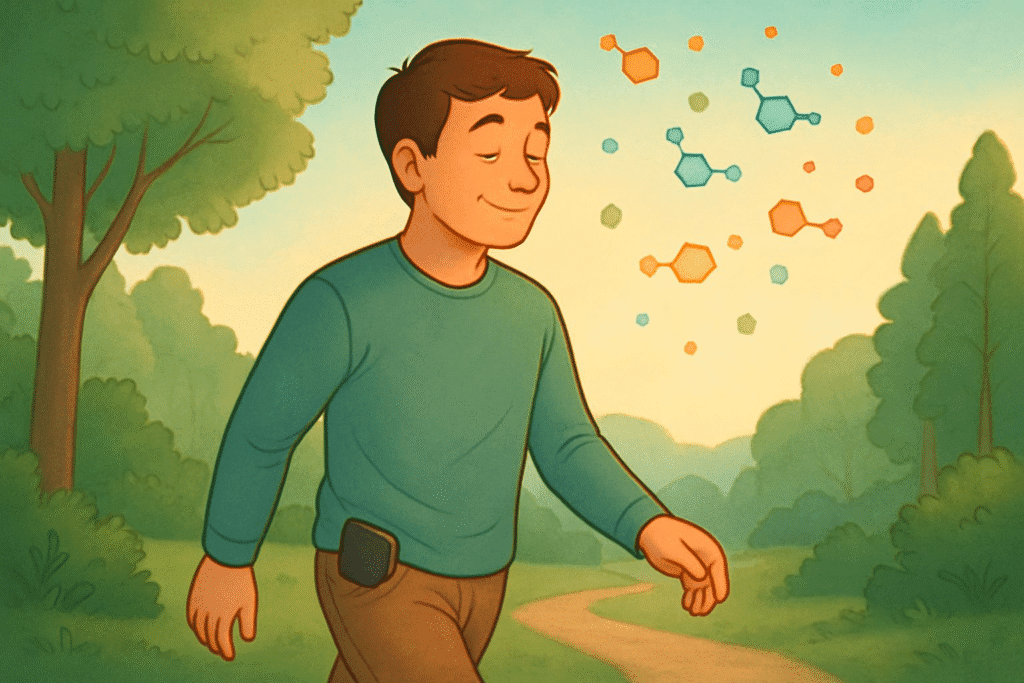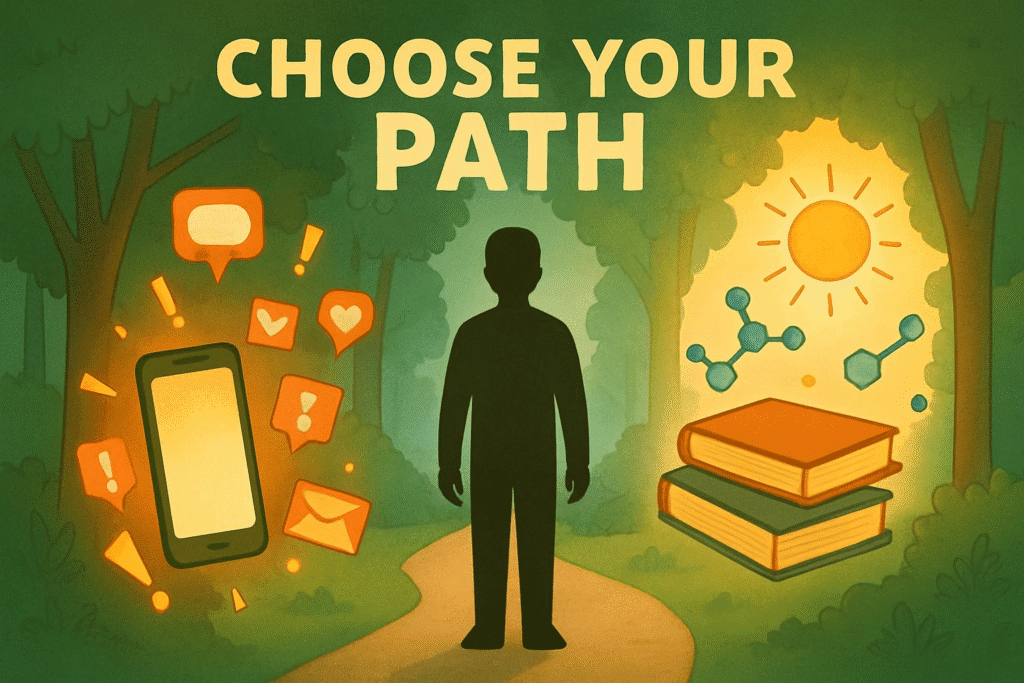Introduction

You’re not weak. Your brain is wired this way.
Every scroll, like, and ping gives you a hit of dopamine — the brain’s reward chemical.
And over time, you’re not in control anymore.
Dopamine is.
This isn’t just addiction — it’s dopamine hijack.
Big Tech designed it that way. Social media, YouTube, reels — all built to create dopamine overload, keeping your brain trapped in an endless dopamine loop.
Your focus? Gone.
Your motivation? Hijacked.
Your attention span? Shattered by infinite scroll addiction.
In this blog, you’ll learn:
- Why dopamine and technology are a dangerous mix
- How your dopamine reward system is rewired by every scroll
- And how to break free from scrolling addiction with real, science-backed steps
Ready to take your brain back? Let’s go.
What Dopamine Really Does to Your Brain
Dopamine isn’t about pleasure. It’s about pursuit.
It’s the chemical that pushes you to want, chase, and repeat.
When you scroll, your brain gets tiny dopamine hits — rewards for doing basically nothing.
This wires your brain to crave more… and more… and more.
Here’s how it hijacks you:
- Instant Gratification: Dopamine spikes when you expect pleasure, not when you get it. That’s why one reel turns into twenty.
- Reward Loop: Your brain gets trapped in a dopamine loop, chasing cheap rewards from likes, views, and endless content.
- Impaired Focus: Constant stimulation breaks your ability to concentrate. The brain rewires to need novelty every few seconds.
- Reduced Motivation: Real tasks (like reading, working, or learning) feel boring because they don’t spike dopamine the same way reels or memes do.
🧠 Fact: Studies in neuroscience show that dopamine and social media function like slot machines — unpredictable rewards that keep you hooked.
This isn’t random. It’s designed.
Why Big Tech Wants You Addicted
Your attention is their currency. Your addiction is their profit.
Social media apps don’t just entertain you — they engineer your brain chemistry.
Here’s what’s really going on:
- Infinite Scroll = Infinite Data: The longer you scroll, the more data they collect. Your behavior is the product.
- Dopamine-Driven Design: Every swipe, like, and notification is crafted to trigger dopamine spikes — making you come back, again and again.
- Hijacked Reward System: Apps exploit your dopamine reward circuit to keep you addicted, just like casinos do with gamblers.
- Built-In Addiction Loops: Variable rewards (unpredictable likes, comments, videos) create dopamine hijack — and your brain can’t resist unpredictability.
📲 Real stat: Former Facebook execs admitted they created features to exploit “dopamine-driven feedback loops” — and warned of their impact on mental health.
You’re not just distracted. You’re being programmed.
What This Does to Your Life (Without You Noticing)
You’re not scrolling. You’re escaping.
And the price?
Focus. Peace. Purpose.
Here’s what dopamine overload is quietly destroying:
- Your Attention Span: Can’t sit through a 10-minute video? That’s dopamine rewiring your brain for constant novelty.
- Your Discipline: Tasks without instant rewards (like working out or studying) feel painful. Dopamine says: “Too slow, too boring.”
- Your Sleep: Dopamine and screen time disrupt melatonin production — keeping your brain wired when it should be resting.
- Your Productivity: You check your phone 100+ times a day. That’s hundreds of dopamine-driven micro-interruptions.
- Your Joy: Constant stimulation numbs you. Simple things — like reading, walking, or talking — feel dull in comparison.
⚠️ Dopamine and anxiety are linked. When your brain gets used to high dopamine hits, anything less creates stress, restlessness, and emptiness.
This isn’t just about phones.
It’s about who you become when dopamine runs the show.
Why Willpower Isn’t Enough to Escape

You can’t out-discipline a dopamine-designed system.
Most people think they’re just lazy or lack control.
But the truth? Your brain is up against billion-dollar algorithms.
Here’s why self-control keeps failing:
- You’re Fighting Biology: Dopamine isn’t optional — it’s how your brain motivates action. And tech hijacks that motivation.
- Triggers Are Everywhere: One notification and you’re back in the dopamine loop before you even realize it.
- Habits Are Neural Pathways: The more you scroll, the stronger the neural link. It’s not a bad habit — it’s a rewired brain.
- Digital Addiction Is Designed: You’re not the problem. The system is.
🧠 Neuroscience insight: The dopamine reward system overrides logic and intention. That’s why you grab your phone even when you know you shouldn’t.
You don’t need more willpower.
You need a dopamine strategy.
How to Reclaim Your Brain (In 5 Brutally Simple Steps)

This isn’t a digital detox. It’s a dopamine reset.
Here’s how to break the scrolling addiction — step by step:
1. Kill Notifications
Every ping = a dopamine spike. Cut the trigger at the root.
2. Replace, Don’t Remove
Don’t just stop scrolling — swap it with something dopamine-neutral like walking, reading, or journaling.
(Dopamine and habits go hand-in-hand.)
3. Use Time Blocks
Schedule phone use like you would a meeting. Keep it intentional, not impulsive.
4. Go 24 Hours Without Stimulation
No reels. No feeds. Just real life. You’ll feel the withdrawal — that’s the dopamine detox at work.
5. Reward Deep Work
After 90 minutes of focus (reading, working out, writing), reward yourself — mindfully. You’re retraining your dopamine reward system.
🧠 The goal isn’t to hate dopamine. It’s to control how you earn it.
Conclusion: Your Brain Wasn’t Built for This

Scrolling isn’t harmless. It’s hijacking who you are.
You think you’re choosing to scroll.
But it’s dopamine — the most powerful motivator in your brain — making the choices for you.
This isn’t about quitting your phone.
It’s about taking back control of your time, focus, and life.
Because every moment you spend chasing artificial dopamine…
…is a moment you lose becoming who you’re meant to be.
Start small. Start now.
But start.
📚 Amazon Book Recommendations
1. Dopamine Nation by Dr. Anna Lembke
A brutally honest look into how dopamine drives addiction in the modern world — and how to reset your brain. Must-read if you’re stuck in the scroll.
2. Digital Minimalism by Cal Newport
Learn how to use technology with intention — not addiction. Newport gives you a framework to declutter your digital life and regain deep focus.
3. The Molecule of More by Daniel Z. Lieberman
Unpacks how dopamine shapes everything from your habits to your happiness — and how to stop letting it control your life.
4. Atomic Habits by James Clear
The go-to guide for rewiring your brain and building better habits. Clear makes it ridiculously simple to break old loops and create new ones.
5. Deep Work by Cal Newport
If you want your focus back, this is your bible. Learn how to train your brain for undistracted, high-impact work — even in a noisy world.
FAQs: Dopamine, Scrolling & Digital Addiction
What is dopamine and how does it affect scrolling?
Dopamine is the brain’s “wanting” chemical — it rewards anticipation, not just outcomes. Scrolling constantly triggers dopamine, keeping you hooked in a loop.
Is dopamine addiction the same as phone addiction?
Not exactly. Dopamine addiction is deeper — it’s about how your brain gets wired to chase cheap, fast rewards like social media or reels.
Can a dopamine detox actually help?
Yes. Even 24–48 hours without fast stimulation can reset your brain’s reward system, reduce cravings, and restore focus.
Why do I feel anxious when I stop scrolling?
That’s withdrawal. Your brain is used to constant dopamine spikes — without them, it feels uncomfortable. It passes with time and conscious effort.
How long does it take to break the scrolling habit?
Most people feel better after 7–14 days of consistent effort. The key is not just stopping, but replacing the habit with intentional, meaningful activities.
